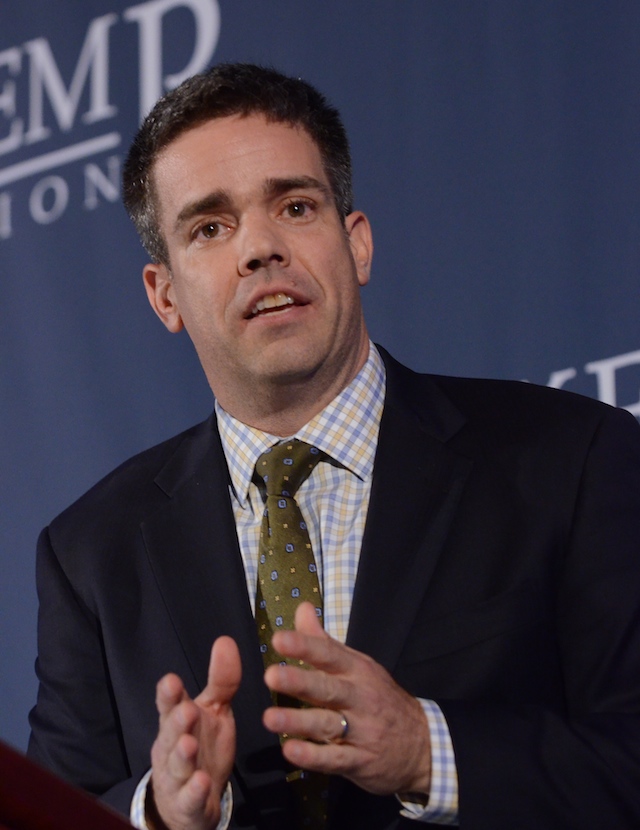by Eric Cochling | Oct 29, 2014
The following is a special report for Georgia Center for Opportunity by Mike Klein. Mike’s other work may be found here.
Video from the Atlanta session may be seen here:
While voters fixate on an election next week that could change Washington’s balance of power, some also are looking ahead to next year’s Federal Election Commission agenda that will include an effort by incoming chair Ann Ravel to overhaul campaign finance disclosure law. Ravel has established her target-of-choice: corporate political action committees and super PAC expenditures after a 2010 U.S. Supreme Court opinion that ended independent spending limits.
Thousands of non-profit groups could become caught in a tidal wave of proposed changes that might impact how local, state and national organizations can advocate for children’s welfare, education, health care and virtually any other policy. The concept of the “anonymous donor” who makes community projects and thinking happen could be derailed without considerable care to protect the rights individuals have to use their personal money as they desire.
“Dark money” is the pejorative term opponents created to talk about corporate political action committee and super PAC spending. Ravel speaks openly about “problems we have with these dark money groups” and her view that “people are getting disgusted about what’s happening.” She says, “Polls have shown that elected officials are primarily serving their large contributors and not their constituents. That view is held equally by Republicans and Democrats.”
The FEC vice chair was at Emory University in Atlanta last week on the final leg of a three-city swing described as a listening tour to gather public input before her 2015 planned initiative. Other stops were Denver in early October and the University of Chicago’s new Institute of Politics that was founded by President Barack Obama’s political operative David Axelrod. Obama appointed Ravel to the six-member Federal Election Commission in October 2013. The FEC has three Republican and three Democratic commissioners. Ravel becomes chair in 2015.
The 1971 Federal Election Campaign Act is the cornerstone of U.S. election law. Perhaps more appropriately, it has become at least a time capsule and perhaps even a tomb as the FECA has not been amended since 1979. Changes to national election finance laws have mainly occurred because of FEC rules and regulations or because federal courts decided various questions brought over three and one-half decades.
In 2010 the U.S. Supreme Court (Citizens United vs. FEC) struck down limits on independent campaign spending by corporations and unions. It opened the door to spending by non-profit groups to support or oppose a candidate without having to disclose donors who could be individuals or other entities including corporations. The Center for Competitive Politics says that spending accounted for $311 million of the $7.3 billion spent in the 2012 election cycle.
Georgia State University law school professor Anne Tucker cited higher numbers when she joined Ravel onstage in Atlanta. Tucker said corporate political action committees spent $360 million in the 2012 election cycle and she said super PAC funds accounted for another $75 million. Tucker said 1,220 super PACs that do not disclose their donors raised over $520 million for the 2014 midterm elections. Tucker like Ravel supports the expansion of disclosure.
Thursday evening’s Emory event was far from a balanced discussion. Twenty-eight speakers approached the microphone and nearly all said the same thing: Someone must stop the inflow of corporate and other big money into politics. “I tell people your vote is your voice but I recently have come to believe that I am wrong. Sadly today your dollar is your voice,” said Robin Collins. “We argue that corporate spending in elections should not be equated to the First Amendment rights of individual citizens,” said Cindy Strickland. Another speaker noted she was “invited to this and also reminded” to attend.
Context is often lost where passion prevails. There was important context from William Loughery who knows of what he speaks. Now living in Georgia, the soft-spoken Loughery is a former chief of staff to United States Senator Arlen Spector, a former FEC staffer and he participated in writing the 1971 Federal Election Campaign Act which as noted above has not been amended in thirty-five years.
“When we wrote the Federal Election Campaign Act there never was any enforcement so why would anyone waste time on independent expenditures,” said Loughery. “The fundamental problem is nobody wants to change the law, nobody wants to make a significant radical change to update it because basically, the whole process would be captive of the current members of Congress and even the members of the Commission are basically captives of Congress. Technology has changed, a lot of other things have changed and there’s nothing being done to update the law.”
Battle plans have specific objectives but battles produce collateral damage. Non-profit groups that focus entirely on policies could become swept up in a federal election campaign law disclosure reform movement. As a young Emory student told the panel, “You have to look for the unintended consequences and protect individual rights, freedom of speech and the legitimacy of our democracy. That’s not an easy task.”
by Georgia Center for Opportunity | Oct 28, 2014
GCO is thrilled to have Jeff and Jimmy Kemp join us at our annual fundraiser on December 4, 2014 at the College Football Hall of Fame in Atlanta. Jeff and Jimmy will be with us to share recollections of their father, the late Jack Kemp, and discuss why his legacy matters today. We will also show how GCO is working each and every day to make Georgia a state where ALL have a real chance to prosper. We look forward to you joining us on December 4, 2014. Register to Attend.
I believe the ultimate imperative for growth and opportunity is to advance human dignity. – Jack Kemp
JEFF KEMP

Jeff Kemp is a quarterback for the family. He is an Ivy League graduate who played eleven seasons as a Quarterback in the National Football League with the Los Angeles Rams, San Francisco Forty-Niners, Seattle Seahawks and the Philadelphia Eagles. Today he is more passionate than ever about strengthening marriages and families and bringing groups and teams together for exciting results.
In 2012, Jeff joined FamilyLife as a Vice President and Catalyst for helping others strengthen families. FamilyLife, based in Little Rock, AR. is a national ministry leader in resources to build and enrich marriages and families along with radio outreach, marriage conferences and other resources to heal and strengthen families. Prior to joining FamilyLife, Jeff founded and led a dynamic organization, named Stronger Families, in the Pacific Northwest from 1993-2010.
JIMMY KEMP

James Kemp (Jimmy) is President of the Jack Kemp Foundation. He is responsible for the creation of the Foundation and secured the donation of his father’s papers to the Library of Congress.
Jimmy serves as a Director of Strategic Business Initiatives at Squire Patton Boggs LLP. He co-founded Kemp Partners, a strategic consulting firm based in Washington, DC, assisting Fortune 500 companies as well as burgeoning firms before Congress, the White House and several federal agencies. He is also an Executive Vice President at Group 47.
Jimmy spent eight seasons as a quarterback in the Canadian Football League, finishing his career in 2001 with the Toronto Argonauts. He also serves as Chairman of the Board for the Hope Community Charter School located in northeast Washington, DC. The school serves 735 pre-K through 8th grade students and has been operating since September 2005.
by Georgia Center for Opportunity | Oct 28, 2014
Visit Duke and UNC Chapel Hill on 11/23/14 – 11/24/14 with Breakthrough Ambassadors. The tour is open to parents and 10th – 12th grade high school students.
Check out this fantastic opportunity through Breakthrough Ambassadors to visit UNC Chapel Hill and Duke for an overnight stay! 10th, 11th, and 12th graders from any high school and parents are all invited – Come and join us. This is a chance that comes to very few, so take advantage of viewing two of the South’s best schools.
COST: $75/person (includes transportation & hotel)
WHEN: Sunday, November 23rd – Depart 7 a.m.
through Monday, November 24th (college visits & return home – around 10:00 p.m.)
HOW: 55 passenger Charter Bus
COLLEGES: Duke University & the University of North Carolina (UNC) Chapel Hill
Space is limited. First come, first served.
Any questions? Contact prhsbreakthrough@gmail.com
Register Now
by Georgia Center for Opportunity | Oct 24, 2014

Employers have a responsibility to make sure the person they hire for a position is a right fit for the job. Background checks are one important part of this process, as they help to determine whether a particular industry or position is suitable for an applicant with a certain criminal history. However, it is vital that criminal records are used properly and not discriminatorily.[i] They should not be used as a screening tool to automatically dismiss all applicants with felony convictions. Rather, they should be used in a discerning manner, causing an employer to examine whether a person’s criminal history has any relation to the position sought. If there is a strong correlation, then there may be reasonable grounds to remove the applicant from consideration. If not, the applicant deserves the same chance as any person to demonstrate his or her qualifications for a job.
What does it mean to “ban the box”?
“Banning the box” refers to removing the question about a person’s criminal history from the initial job application and postponing the question to a later point in the hiring process. This policy increases the likelihood that a person with a criminal record will get hired by giving the applicant an opportunity to demonstrate his or her qualifications for a job without automatically being screened from the hiring process.
Postponing the question of an applicant’s criminal history to a later point in the hiring process allows applicants to explain their criminal record to an employer in person. This face-to-face interaction is essential to increasing an ex-offender’s chance of becoming employed. It provides an ex-offender the opportunity to be candid about his or her past and to explain how overcoming setbacks have fashioned him or her into a qualified candidate for the position. This conversation gives an employer the chance to listen to the ex-offender’s story, relate to him or her as a person, and get a better grasp of the person’s character and strengths. By giving ex-offenders the opportunity to represent themselves in the best light and to prove how qualified they are for a position, an employer may find his or her best candidate for the job.
Who is “banning the box”?
States, counties, and cities across the nation are establishing fair hiring polices for ex-offenders by “banning the box” on applications for public employment.
As of September 2014, thirty states have a local or state-level “ban the box” fair hiring policy for public employers. Among these states, thirteen have enacted statewide fair hiring laws, and six have also extended the fair chance policy to government contractors or private employers.[ii]
Nationwide, almost seventy cities and counties – including Atlanta and Fulton County – have taken steps to remove barriers to employment for qualified workers with records, and twenty of these cities and counties have extended “ban the box” policies to government contractors or private employers.[iii]
Why should Georgia “ban the box”?
Although the Governor spoke of “banning the box” earlier this year, he has not yet issued an executive order for state employers to do so. Taking this decisive step will be important for continuing the reforms his office has worked so hard to carry out this year to improve outcomes for returning citizens.
By following the precedent set by Atlanta and Fulton County and officially embracing “ban the box” policies for state employers, the state can help more people with criminal records get good jobs for which they qualify. This, in turn, will improve their chance of successfully reintegrating into society, decrease their chance of recidivating, enable them to benefit employers, and allow them to contribute to the economy of the state.
Embracing this policy at the state level will also encourage county, city, and even private employers across Georgia to follow suit.
For proof that “ban the box” policies help people with criminal records get good jobs and benefit employers, check out Durham, NC’s success story by clicking here.
This post was adapted from Georgia Center for Opportunity’s December 2013 report titled Increasing Employment Opportunities for Ex-Offenders.
Image credit: GT L&E Blog (featured image) and Accurate Background, Inc.
[i] U.S. Equal Employment Opportunity Commission, “Consideration of Arrest and Conviction Records in Employment Decisions Under Title VII of the Civil Rights Act of 1964,” Office of Legal Counsel, April 25, 2012, accessed November 29, 2013, https://www.eeoc.gov/laws/guidance/arrest_conviction.cfm.
[ii] National Employment Law Project, Ban the Box: U.S. Cities, Counties, and States Adopt Fair Hiring Policies to Reduce Unfair Barriers to Employment of People with Criminal Records, September 2014, ii, 3, https://www.nelp.org/page/-/SCLP/Ban-the-Box.Current.pdf?nocdn=1.
[iii] Ibid., 1-2.
by Georgia Center for Opportunity | Oct 15, 2014

Click the link to register for the event: secure.foropportunity.org/breakthroughshowcase



